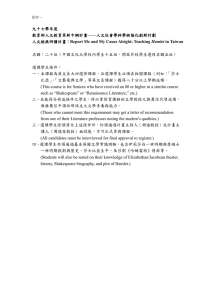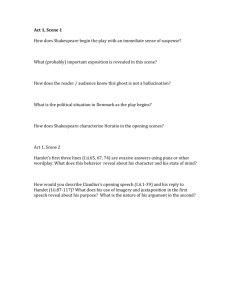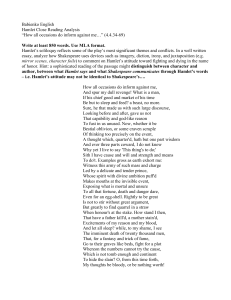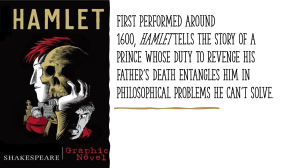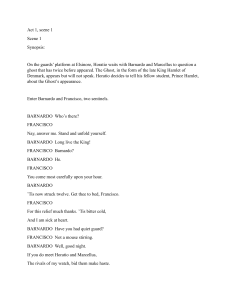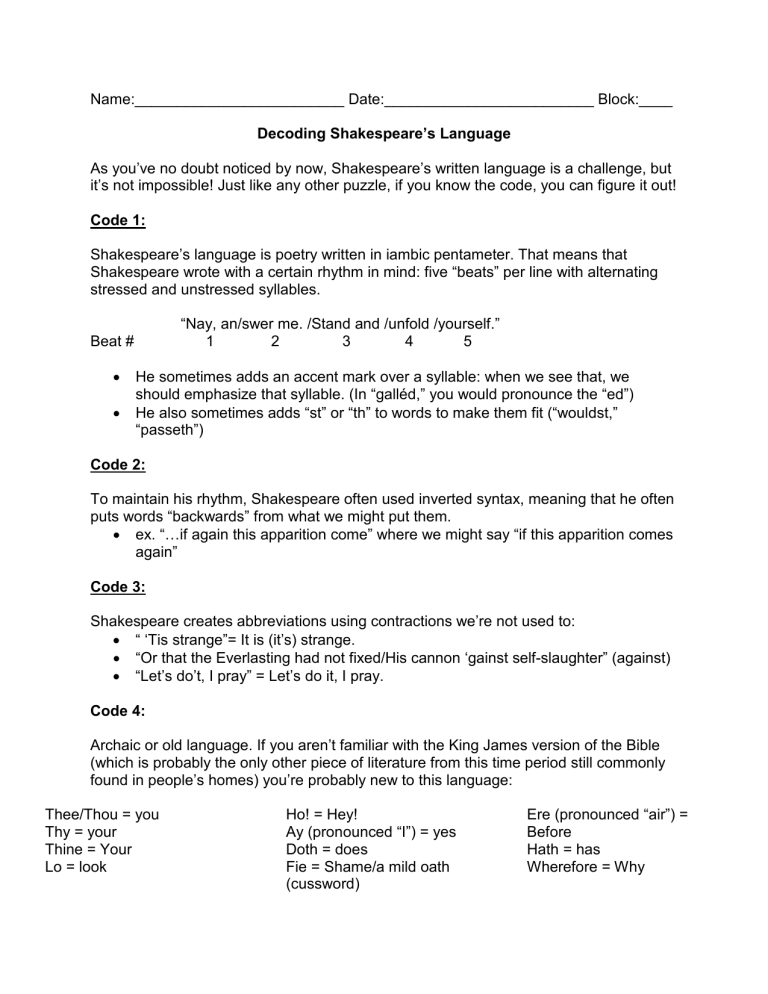
Name:_________________________ Date:_________________________ Block:____ Decoding Shakespeare’s Language As you’ve no doubt noticed by now, Shakespeare’s written language is a challenge, but it’s not impossible! Just like any other puzzle, if you know the code, you can figure it out! Code 1: Shakespeare’s language is poetry written in iambic pentameter. That means that Shakespeare wrote with a certain rhythm in mind: five “beats” per line with alternating stressed and unstressed syllables. “Nay, an/swer me. /Stand and /unfold /yourself.” 1 2 3 4 5 Beat # • • He sometimes adds an accent mark over a syllable: when we see that, we should emphasize that syllable. (In “galléd,” you would pronounce the “ed”) He also sometimes adds “st” or “th” to words to make them fit (“wouldst,” “passeth”) Code 2: To maintain his rhythm, Shakespeare often used inverted syntax, meaning that he often puts words “backwards” from what we might put them. • ex. “…if again this apparition come” where we might say “if this apparition comes again” Code 3: Shakespeare creates abbreviations using contractions we’re not used to: • “ ‘Tis strange”= It is (it’s) strange. • “Or that the Everlasting had not fixed/His cannon ‘gainst self-slaughter” (against) • “Let’s do’t, I pray” = Let’s do it, I pray. Code 4: Archaic or old language. If you aren’t familiar with the King James version of the Bible (which is probably the only other piece of literature from this time period still commonly found in people’s homes) you’re probably new to this language: Thee/Thou = you Thy = your Thine = Your Lo = look Ho! = Hey! Ay (pronounced “I”) = yes Doth = does Fie = Shame/a mild oath (cussword) Ere (pronounced “air”) = Before Hath = has Wherefore = Why Use these “codes” to help you “decode” the following passages from Act I. Paraphrase as much as you can! Original Lines Your paraphrase (translation) Original Lines Your paraphrase (translation) 1. Marcellus: Horatio says ‘tis but our fantasy And will not let belief take hold of him Touching this dreaded sight twice seen of us. 2. Marcellus: Who is ‘t that can inform me? 3. Hamlet: Ay, madam, it is common. Hamlet: Gertrude: If it be, Why seems it so particular with thee? Gertrude: 4. Hamlet: These indeed “seem,” For they are actions that a man might play But I have that within which passeth show, These but the trappings and the suits of woe.” 5. Horatio: Two nights together had these gentlemen, Marcellus and Barnardo, on their watch, In the dead waste and middle of the night, Been thus encountered: a figure like your father. 6. Laertes: (talking about Prince Hamlet) He may not, as unvalued persons do, Carve for himself, for on his choice depends The safety and health of this whole state. 7. Ophelia: He hath, my lord, of late, made many tenders Of his affection to me. 8. Horatio: Indeed? I heard it not. It then draws near the season Wherein the spirit held his wont to walk. 9. Hamlet: (to the Ghost) Be thy intents wicked or charitable, Thou comest in such a questionable shape That I will speak to thee. 10. Hamlet: Why, what should be the fear? I do not set my life in a pin’s fee, And for my soul—what can it do to that…
